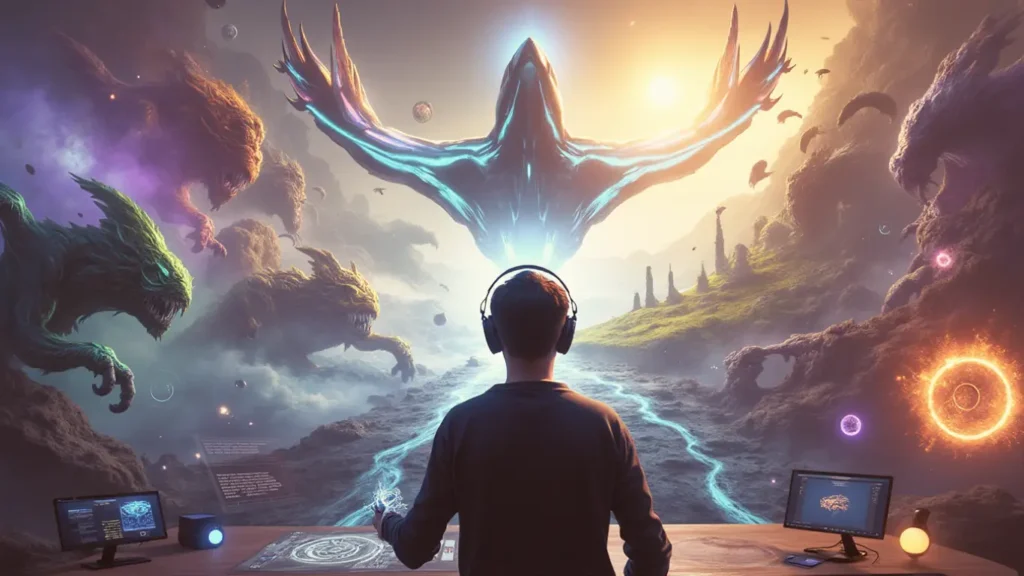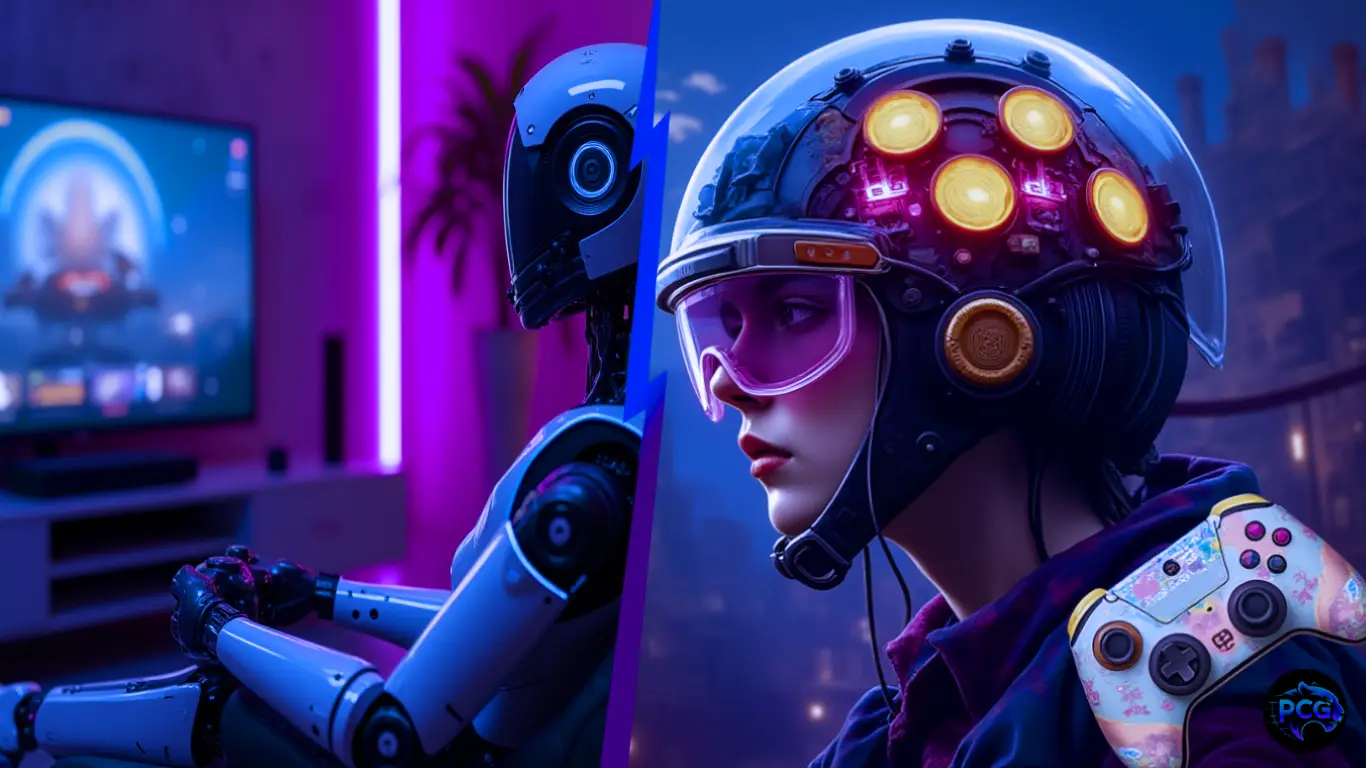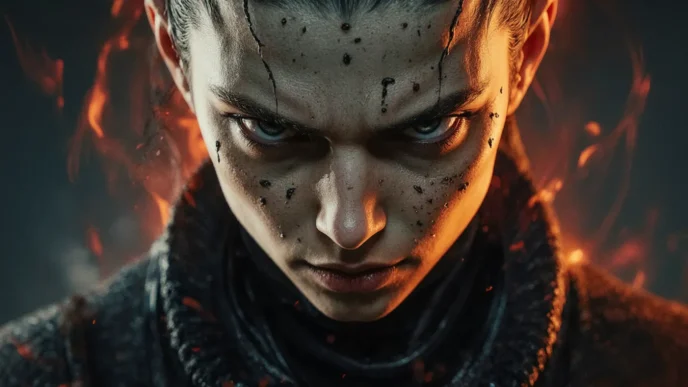Introduction
Ever tried having a meaningful conversation with an NPC who responds like a broken record? In 2025, those days are fading as AI is Transforming Gaming to unprecedented heights, delivering characters that truly engage, stories that evolve with your choices, and personalized experiences across both PC and console platforms.

From intelligent matchmaking that ensures fair and fun multiplayer battles to stunningly realistic graphics and dynamic worlds that react to every move you make, AI is revolutionizing every facet of the gaming experience. Whether you’re embarking on epic solo adventures or teaming up with friends, the integration of advanced AI technologies is crafting more immersive, responsive, and enjoyable games that make every player feel uniquely valued and deeply connected to their virtual journeys.
In this era of innovation, AI isn’t just enhancing gameplay—it’s redefining it entirely. By combining cutting-edge algorithms with creative design, developers are creating richer, more interactive worlds where every choice matters.
Let’s dive into how AI is transforming key aspects of gaming in 2025.
Table of Contents
Smarter NPCs: How AI is Revolutionizing Character Behavior in 2025
The evolution of NPCs has taken a giant leap forward with AI advancements propelling game design into uncharted territory. In 2025, smarter NPCs are no longer bound by repetitive scripts; instead, they exhibit complex behaviors that respond intuitively to player actions.
This transformation not only heightens realism but also deeply enhances player engagement, creating immersive worlds that feel truly dynamic and responsive.
Industry experts are buzzing about the potential of AI to redefine gaming experiences. AI-driven NPCs can now learn and evolve, offering personalized interactions that adapt to each player’s unique style.
This level of customization was simply unattainable a few years ago. With these intelligent characters, games are shifting from linear narratives to rich, interactive stories where every decision can lead to unforeseen outcomes, keeping players hooked like never before.
These intelligent characters remember past interactions, adjust their strategies during combat, and even develop relationships with players over time. For example, an NPC might react differently based on whether you helped them earlier in the story or ignored their requests.
Such depth transforms NPCs from static entities into integral parts of the narrative, fostering deeper connections between players and the game world.
AI-Powered Storytelling: Creating Dynamic and Immersive Game Worlds
Gone are the days of predictable plot lines and static narratives. With artificial intelligence at the helm, game developers are revolutionizing storytelling, crafting dynamic story arcs that respond to every player action.
This evolution not only deepens immersion but also empowers players to shape their own unique experiences within the game world, breaking free from the constraints of traditional linear storytelling.

Consider the groundbreaking advancements in CyberSphere 2025, where AI-driven narratives adapt in real-time to player decisions, altering character behaviors and plot outcomes on the fly.
This level of interactivity transforms NPCs from mere background characters into integral parts of the story, capable of evolving alongside the player. By leveraging machine learning algorithms, developers create living, breathing worlds that offer endless variability and replayability, setting a new standard for what immersive gaming can achieve.
This level of interactivity blurs the line between creator and participant, empowering players to craft truly personal experiences.
Features like procedural content generation ensure endless variability, while adaptive dialogue systems allow for nuanced conversations. As a result, every playthrough feels fresh and unique, setting a new standard for immersive gaming.
Enhanced Player Experience: AI’s Role in Customizing Gameplay for PC and Console
Artificial Intelligence is revolutionizing how gamers interact with their favorite titles on both PC and console platforms. Gone are the days of one-size-fits-all experiences; today’s AI-driven systems tailor gameplay dynamically to match individual player styles and preferences.
Whether you prefer stealthy approaches or all-out action, AI adjusts the game environment and challenges in real-time, ensuring every session feels unique and engaging.
Smarter NPCs (Non-Player Characters) are at the heart of this transformation. These characters can now exhibit more realistic behaviors, respond intelligently to player actions, and even develop their own strategies.
This leads to more immersive storylines and interactions that feel genuinely responsive, breaking the barrier between the game and the player.
Additionally, AI-powered customization tools allow gamers to modify game settings effortlessly, enhancing accessibility and ensuring that each player can enjoy a personalized experience tailored specifically to their gaming preferences.
Moreover, AI’s integration into multiplayer environments optimizes matchmaking by analyzing player skill levels and playstyles, creating balanced and competitive matches every time. This not only elevates the overall gaming experience but also fosters a more inclusive and enjoyable community.

As AI continues to evolve, the future of gaming promises even more sophisticated personalization, making every game session not just a pastime, but a uniquely tailored adventure.
Additionally, AI-powered tools simplify customization, allowing players to modify settings effortlessly. Features like voice recognition and natural language processing further enhance accessibility, making gaming more inclusive for individuals with disabilities.
Real-time adjustments ensure balanced challenges, keeping all players engaged regardless of skill level.
The Future of Multiplayer: AI-Driven Matchmaking and Fair Play in 2025
Imagine logging into your favorite multiplayer games where every match feels tailor-made just for you. Gone are the days of endless queuing and mismatched skill levels.
Thanks to cutting-edge AI-driven matchmaking, players are now paired based on intricate algorithms that consider not only skill but also playstyle, ensuring a more balanced and engaging experience.

But it’s not just about finding the right opponents. Fair play is taking on a whole new meaning with AI monitoring every move in real-time. Cheaters and toxic behavior ?
A thing of the past. Here’s what you can expect:
- Adaptive Matchmaking Systems: Continuously learning from player behavior to improve match quality.
- Real-Time Anti-Cheat Mechanisms: Instantly detecting and mitigating unfair play.
- Personalized Gaming Experiences: AI tailoring game settings and challenges to your unique preferences.
Adaptive algorithms continuously learn from player behavior, improving match quality over time. Real-time anti-cheat mechanisms detect and mitigate unfair practices, ensuring a level playing field for everyone.
Furthermore, these innovations foster healthier communities by reducing frustration and promoting positive interactions among players.
These advancements aren’t just enhancing the way we play; they’re revolutionizing the very essence of multiplayer gaming.
With AI ensuring every match is fair and every player is engaged, the future of gaming looks not only smarter but also significantly more enjoyable for everyone involved.
AI in Graphics and Physics: Realistic Environments for PC and Console Games
By 2025, AI-driven advanced technologies have revolutionized the visual fidelity and physical interactions within PC and console games.
Developers harness machine learning to create hyper-realistic environments that dynamically respond to player inputs, enhancing overall immersive experiences. This shift not only elevates the aesthetic quality of games but also ensures that each session feels unique and engaging.
- Dynamic Lighting and Shadows: AI systems adjust lighting in real-time, creating authentic day-night cycles and realistic shadow movements that react to player actions and environmental changes.
- Advanced Physics Engines: Enhanced by AI, physics engines simulate real-world behaviors of objects, allowing for more believable interactions and unexpected outcomes that keep players on their toes.
- Procedural Environment Generation: Utilizing AI, games can generate vast and varied landscapes on the fly, ensuring that no two game worlds are identical and providing endless exploration opportunities.
These AI-enhanced graphics and physics not only push the boundaries of what’s visually possible but also deepen the player’s connection to the game world. By introducing smarter interactions and more responsive environments, AI is setting a new standard for game realism and player immersion, transforming the gaming landscape into a more vivid and interactive realm.
For instance, imagine exploring a sprawling forest where trees sway naturally in response to weather changes or navigating urban landscapes where buildings crumble realistically under explosions.
Such attention to detail sets a new standard for visual fidelity in gaming, making every session feel unique and captivating.
Voice Recognition and Natural Language Processing: Redefining Player Interaction
In the evolving landscape of gaming by 2025, Voice Recognition and Natural Language Processing (NLP) are revolutionizing how players connect with their virtual worlds.
Gone are the days of button-mashing and repetitive commands; now, gamers can engage with Non-Player Characters (NPCs) in a more natural and immersive manner.
This shift not only enhances the player experience but also opens up new avenues for storytelling and interaction.
Here’s how these technologies are making waves:
- Dynamic Conversations: NPCs can understand and respond to a wide range of player inputs, making interactions feel more real and less scripted.
- Enhanced Accessibility: Players with disabilities or those who prefer voice commands find games more accessible and enjoyable.
- Personalized Gameplay: Games can adapt to the player’s style of communication, offering a tailored experience that evolves over time.
By leveraging voice commands and sophisticated language models, developers are crafting experiences that feel uniquely interactive.
This not only deepens player engagement but also sets the stage for innovative game mechanics that were once thought impossible.
As we move forward, the integration of these technologies promises to blur the lines between reality and the virtual, creating a gaming universe that is more responsive and alive than ever before.
Through sophisticated language models, NPCs understand and respond to diverse player inputs, leading to more authentic and engaging interactions. This capability expands accessibility, benefiting players with disabilities or those who prefer hands-free interaction.
By adapting to different communication styles, AI crafts tailored experiences that evolve alongside the player.
Cross-Platform AI Integration: Bridging PC and Console Gaming in 2025
In 2025, the gaming landscape is witnessing a seismic shift as AI integration seamlessly bridges the gap between PC and console platforms. Gamers no longer face fragmented experiences; instead, intelligent systems ensure that gameplay remains consistent and immersive across all devices.
This breakthrough not only enhances multiplayer interactions but also leverages AI to adapt game mechanics dynamically, catering to the unique strengths of each platform.
AI-driven technologies are revolutionizing cross-platform compatibility by optimizing performance and minimizing latency issues that once plagued multiplayer sessions.
Smart algorithms analyze player behavior in real-time, adjusting settings to provide a smoother and more responsive gaming experience regardless of the hardware being used.
Moreover, AI enhances security measures, ensuring that players enjoy a fair and protected environment whether they’re gaming on a PC or a console.
The fusion of AI with cross-platform gaming is also paving the way for more personalized and engaging experiences. Intelligent NPCs can now interact seamlessly with players across different platforms, offering tailored challenges and narratives that enhance the overall gameplay.

As a result, the boundaries between PC and console gaming are dissolving, creating a unified ecosystem where AI plays a pivotal role in delivering unparalleled gaming experiences.
Smart algorithms optimize performance in real-time, minimizing latency and maximizing responsiveness regardless of hardware limitations.
Additionally, shared ecosystems allow players to interact fluidly between platforms, enhancing multiplayer experiences.
As boundaries between PC and console gaming dissolve, AI-driven NPCs and adaptive mechanics cater to the strengths of each platform, delivering unparalleled versatility and convenience.
Frequently Asked Questions
How does AI dynamically adjust game difficulty?
AI analyzes player performance metrics such as completion times, accuracy, and decision-making patterns in real-time. Based on this data, it modifies enemy strength, puzzle complexity, or environmental hazards to maintain optimal challenge levels.
Can AI generate entirely new levels or missions?
Yes, AI leverages procedural generation techniques to create unique levels, quests, and scenarios dynamically. By combining pre-defined assets with randomized elements, it ensures endless variety and replayability.
Does AI help prevent cheating in online games?
Absolutely. AI monitors player behavior for anomalies indicative of cheating, such as unrealistic movement speeds or frequent wins against superior opponents. Detected violations trigger immediate countermeasures, preserving fairness.
How does AI enhance customization options?
Through machine learning, AI learns player preferences regarding aesthetics, mechanics, and difficulty. It then tailors environments, character designs, and gameplay parameters to align with those tastes, creating highly personalized experiences.
What role does AI play in analyzing player behavior?
AI collects and interprets behavioral data to identify trends, preferences, and pain points. Developers use this information to refine gameplay mechanics, introduce new features, and plan future updates effectively.
Is AI capable of generating realistic facial animations for NPCs?
Yes, AI employs deep learning models to analyze human expressions and replicate them digitally. This results in lifelike facial animations that convey emotions convincingly, enhancing NPC believability.
Can AI assist in designing better tutorial systems?
Indeed. AI evaluates player proficiency during early stages and adapts tutorials accordingly. Beginners receive detailed guidance, while experienced players skip redundant instructions, streamlining the learning curve.
Will AI replace traditional game designers?
Not entirely. While AI automates certain tasks, human creativity remains indispensable for conceptualizing innovative ideas and crafting compelling narratives. AI serves as a powerful tool rather than a replacement.
How does AI contribute to environmental storytelling?
By analyzing player movements and interactions, AI modifies surroundings to reflect ongoing events or reveal hidden lore. Subtle changes, such as weather shifts or ambient sounds, enrich storytelling without intrusive exposition.
Are there ethical concerns surrounding AI in gaming?
Potentially. Issues like data privacy, algorithmic bias, and excessive reliance on automation must be addressed responsibly. Transparent policies and robust safeguards ensure AI benefits all stakeholders equitably.














